Crawling Back: Amazing Spider-Man Annual #5 Review
A dramatic international adventure creates a different tone for a Spider-Man annual, even if the premise and execution are somewhat awkward
—by Nathan on August 11, 2024—
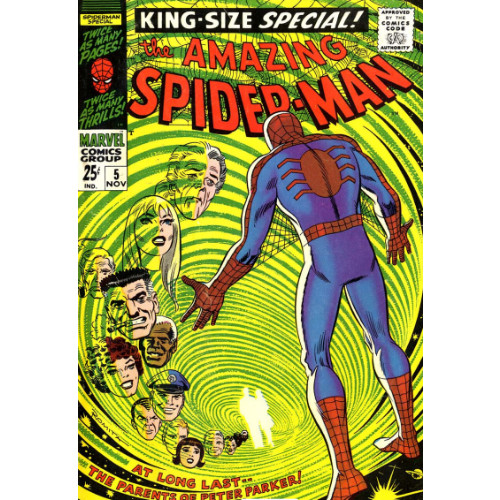
As one of my last "Spider-view" posts dove into the mysterious return of Peter Parker's parents, Richard and Mary Parker, and as several upcoming ASM-focused "Spider-view" posts will explore their mysterious return further, I wanted to take a step back to analyze the story which first introduced us to Peter's parents.
I intended to post this a while ago, shortly after the "Fathers and Sins" review. But to corrupt a famous quote by chaos theorist Ian Malcolm, "Life…gets in the way." Between a few other projects and the intense final months of a masters program, I found myself veering away from blogging. Sure, I posted here and there, but large gaps exist between blogs. Look no further than my celebratory Captain America: War and Remembrance review and my examination of the initial volume collecting the first issues of Alan Moore's Swamp Thing run. A whole month between the two.
But with that program finished, I'm back in full-swing, much like a certain web-spinning Spider-Man. And unlike a certain web-spinning Spider-Man, the hiatus didn't last twenty years, which is approximately the time between Peter's parents' deaths…and his discovery of their own secret identities.
"The Parents of Peter Parker"
Writer: Stan Lee (main story and back-up strips)
Pencilers: Larry Lieber (main story and back-up strips) and Marie Severin (back-up strips)
Inkers: Mike Esposito (main story and back-up strips) and Frank Giacola (back-up strips)
Colorist: Unknown
Letterer: Artie Simek (main story and back-up strips)
Issue: Amazing Spider-Man Annual #5
Issue Publication Date: November 1968
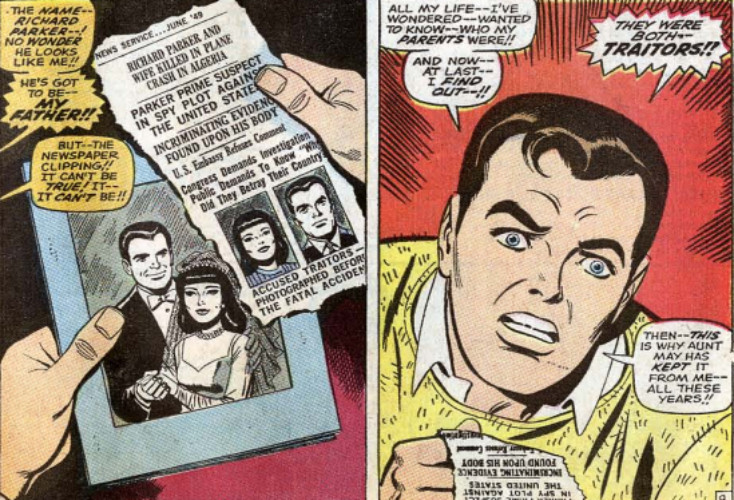
I've skipped over covering the third and fourth ASM annuals, my last review centered on Spidey's first team-up with the magical Doctor Strange. I've just not had much reason to tackle those annuals, but as the occasion arises, I'll certainly give them a once-over. For now, as Peter Parker's parents' ponderously perilous public standing is pertinent in "Spider-view," I wanted to turn back the pages to 1968, where we first learned of the enigmatic Richard and Mary Parker.
Peter's an orphan. It's a Spidey staple, up there with the spider-bite and the death of Uncle Ben as an integral aspect of Peter's core characteristics. Stan Lee and Steve Ditko never outright call Peter an orphan in Amazing Fantasy #15, but by placing Peter in the care of his uncle and aunt, the message is pretty clear: Peter's biological parents are, for whatever reason, no longer in the picture, leaving Ben and May to be, in Peter's words, "the greatest family any fella ever had!" Peter's love for the two is palpable, and when his inaction leads to Ben's death later in the issue, Peter becomes the man of the house, the primary caretaker for his doting Aunt May. She's the only family he has left, and the two shoulder on through financial crises and medical crises as Peter balances living in the real world with fighting crime as a costumed superhero.
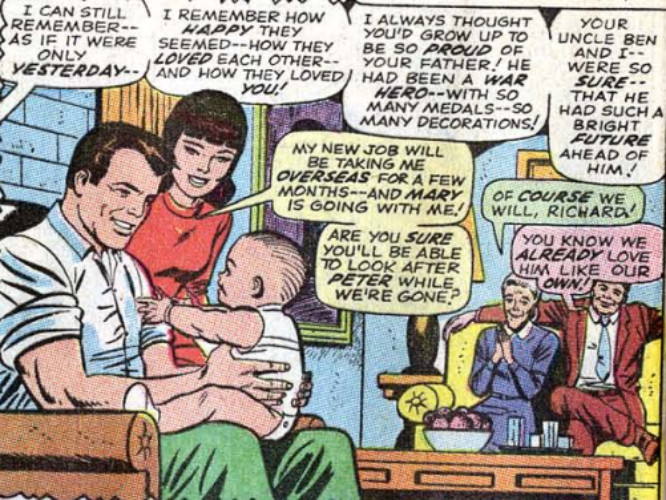
I don't recall how often Lee mentioned Peter's parents during his run. By time this annual was published, Spidey had been around for six years, and the 66th issue of ASM was published the same month as this annual. I know the concept of Peter's orphan status was periodically referenced–right before he's kidnapped and unmasked by the Green Goblin in ASM #39, Peter relates to Harry Osborn as someone without the influence of parental figures, with Harry's mom having passed and his father generally absent (for who knows what reason). So the fact had been established–Peter Parker is an orphan–but I couldn't tell you how often Lee let him linger on the notion until this issue.
The mystery of Peter's parents hits full force as this annual opens, with Lee and his brother Larry Lieber leading us through a pretty decent fight between Spidey and a bunch of thugs in Algeria, a surprising departure from the rooftops and back alleys of New York City. The immediate distance from his usual stomping grounds gives the issue a thriller-esque vibe from page one, as does the sudden appearance of knife-wielding baddies. Lee uses the fight to transition into the past, where Peter becomes aware of a grim secret even Aunt May was hiding from him: the Parkers, quite possibly, were traitors to the United States government! And only Spider-Man, egged on by an underlying irritation, can clear their names!
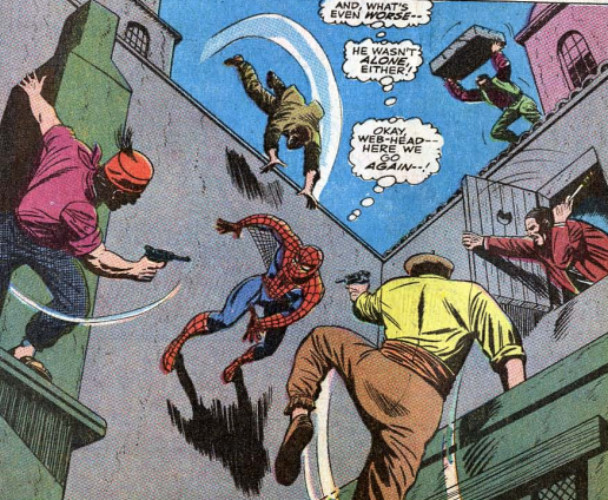
I will admit to a bit of an eye-roll reaction to this sudden twist. Peter's parents never, necessarily, needed to be anybody. They could've just died in a plane crash. End of story. But comics feel the need, from time to time, to twist the pasts of their protagonists' parents, just to offer some retroactive development to a hero's origin or personality. Thomas and Martha Wayne originally died in a random mugging, which was later retconned as a targeted attack. Frank Miller decided that "Battlin'" Jack Murdock getting killed for throwing fights wasn't enough–he had the father of the future Daredevil become a legbreaker in his and John Romita Jr.'s Man Without Fear limited series. The trope, I suppose, gives our heroes something more to fight for or avenge–Batman, instead of swearing revenge against one thug with a gun, targets a whole criminal conspiracy to avenge his parents' double murder. Matt Murdock grapples with his father's darkened past while taking down the thugs responsible for Jack Murdock's death.
And Peter Parker, a hero in his own right, must ascertain whether his parents–his father, in particular–betrayed their country…and restore their names if they didn't. Is it overly complicated and somewhat convoluted? Absolutely. My honest assessment is that I wish the "double agent" bit was never attached to the Parkers. Too many bizarre coincidences, and it adds an unnecessary mystique to their history. But for Peter, as a character (and perhaps, in Lee's mind, just as a man), can't rest until he discerns the truth, whatever it may be.
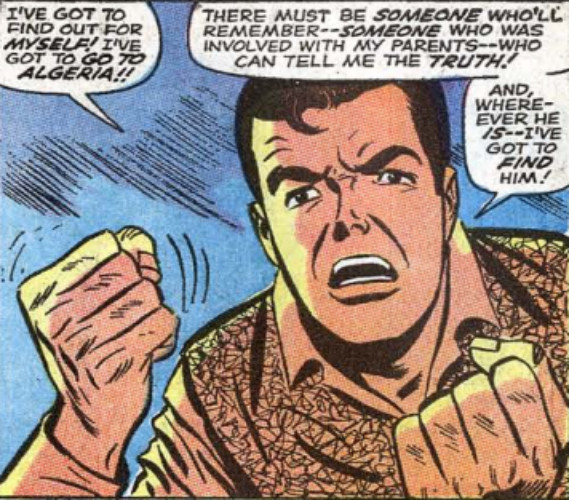
Thus, this globe-trotting spectacle is born, and as a work of sheer entertainment, Lee and Lieber (or, I guess, "Lieber and Lieber") hit all the right notes. Spidey crosses the ocean on a daring escapade, bounding across rooftops and trading blows with deadly criminals and assassins. There's a James Bond sheen to the whole thing, with the issue feeling more like a Batman adventure than a Spidey yarn, including a colorful villain (literally, a color factors into his name), a fistfight with a burly henchman, and a hired killer called the Finisher who fires missiles from the back of his car.
(who, as an aside, Spidey "accidentally" kills?!? Peter totally leads a missile into the dude's car, which blows to bits, but I don't think Peter intended to kill him…? But, c'mon, he had to know that a deadly missile fired at him would have deadly ramifications…right? I mean, this isn't as black-and-white as Peter punching poor Charlie in the face in that graveyard that one time, but this is the second missile the Finisher has shot at Peter, and Spidey diverted that one into a canal, so…aw, take a read for yourself and decide: does Spidey deliberately finish the Finisher?)
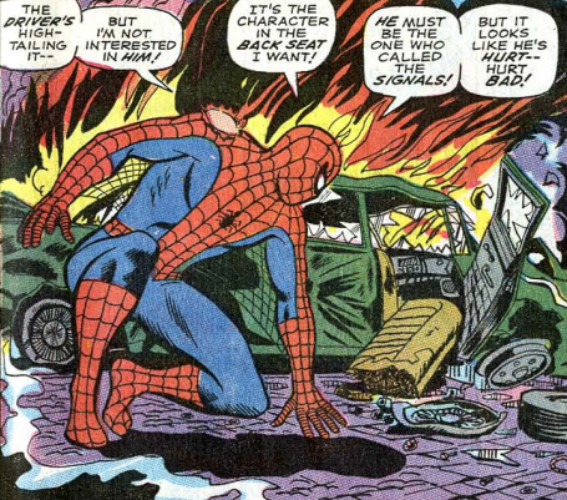
Tonally, the "spy thriller" feel makes for fun reading, the convolutedness of the annual's premise notwithstanding. I enjoyed watching Spidey out of his element, plumbing the depths of a mystery on foreign soil; he's driven by a sense of justice in this issue, and Lee allows Spidey space to wrestle with the possible conclusions: either his parents are innocent…or they were double agents that betrayed the U.S. government. Peter grappling with the possible answers is balanced with him choosing to pursue those answers, that the truth needs to be found regardless of what it is.
There is some patented Stan Lee oddness about the issue, even if we ignore the whole "Spidey may have intentionally murdered a guy with a missile" piece. And I'm not talking about the moment where a thug tries to crush Spidey with a cart full of watermelons either, which is more funny than strange. I'm talking about the fact that, when Peter stumbles upon the possibility of his parents' "double agent" status, he learns their names and sees their faces for the very first time. I can totally see Aunt May hiding from Peter the fact his parents are considered double agents–this isn't the internet age, so I fully believe that tucking away some newspaper clippings in an old trunk and never talking about it is enough for May to cover up the truth. But not telling Peter their names or showing him a picture? C'mon, May. I feel certain Peter would have had to have asked for a name or to see an image at some point. The fact he never has should've made him suspicious in the first place! Lee endeavors to use the moment to create a connection between Peter and May–that, just like Peter hides his double life from her, May has secrets of her own–which is a compelling notion, but there's a lack of practicality here I just don't believe.
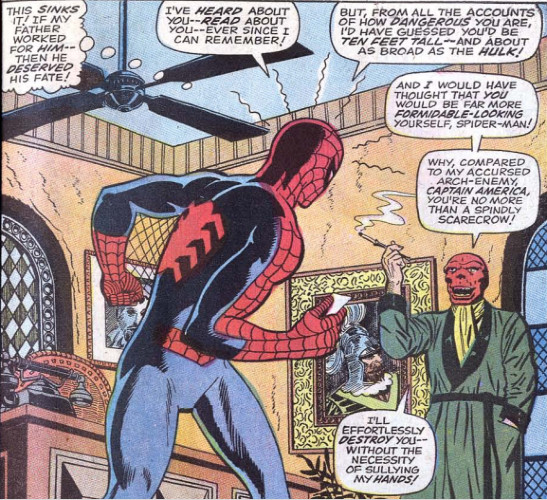
As this is an annual, a few back-up pieces pop up, largely some fun images–a couple Peter Parker pin-ups, a map of New York City overlaid with important Spider-Man locales, and a few Spider-Men drawn in the styles of Dick Tracey, Archie, Mickey Mouse, and Charlie Brown. The real winner of these bonuses is a fun three-page strip where Lee, his brother, and John Romita struggle to develop a plot for a story, with coincidence largely factoring into their plans in a "Batman and Robin figure out the Riddler's clues" fashion found in the Adam West-led series. So nothing important here, but if you want some fun, it's worth giving a gander.
I'm reviewing this annual now because it offers important context for issues I've already analyzed and issues I will be looking at in the (hopefully) near future. As a standalone narrative, removed from the context in which I'm writing about it, ASM Annual #5 isn't a bad story on its own–yes, it has its goofy moments (Spidey's lackadaisical redirect of an oncoming missile, Peter never having seen his parents' faces or knowing their names before, the murder-attempt-by-melon cart), but Lee and his brother give us something a little different than your average, paint-by-numbers, villain-of-the-month Spider-Man issue: a thriller, a continent-hopping yarn, a trek into the unknown as one man desperately seeks the answers he needs to determine how he must frame (or re-frame) his outlook of his mother and father for the rest of his life.